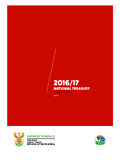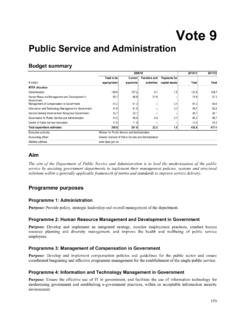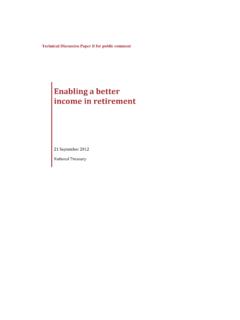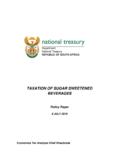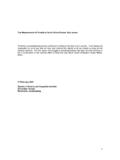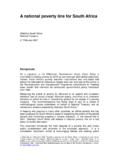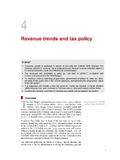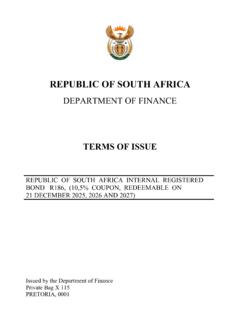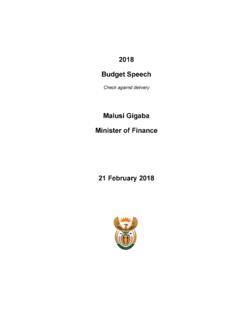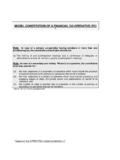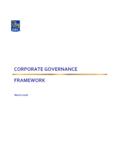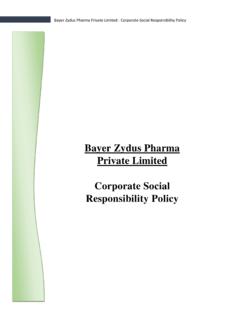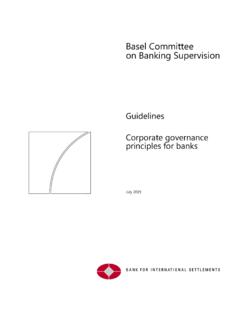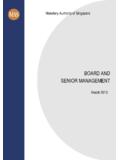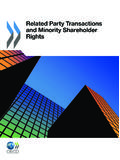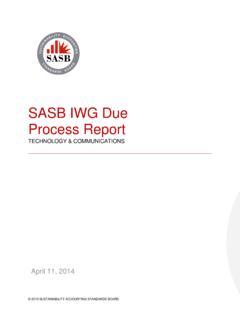Transcription of South Africa peer review report - National Treasury
1 Peer review of South Africa review report 5 February 2013 2 Peer review of South Africa review report Table of Contents Foreword .. 3 Abbreviations .. 4 Executive summary .. 5 1. Introduction .. 9 2. Interagency coordination and the regulatory structure .. 10 3. OTC derivatives market reforms .. 18 Annex 1: Structure of the financial system and regulatory developments .. 27 Annex 2: Other key FSAP and ROSC recommendations .. 31 Annex 3: Overview of South Africa s reforms to its OTC derivatives markets .. 39 3 Foreword Financial Stability Board (FSB) member jurisdictions have committed, under the FSB Charter and in the FSB Framework for Strengthening Adherence to International Standards1, to undergo periodic peer reviews.
2 To fulfil this responsibility, the FSB has established a regular programme of country and thematic peer reviews of its member jurisdictions. Country reviews focus on the implementation and effectiveness of regulatory, supervisory or other financial sector standards and policies agreed within the FSB, as well as their effectiveness in achieving desired outcomes. They examine the steps taken or planned by National authorities to address International Monetary Fund-World Bank Financial Sector Assessment Program (FSAP) and report on the Observance of Standards and Codes (ROSC) recommendations on financial regulation and supervision as well as on institutional and market infrastructure that are deemed most important and relevant to the FSB s core mandate of promoting financial stability.
3 Country reviews can also focus on regulatory, supervisory or other financial sector policy issues not covered in the FSAP that are timely and topical for the jurisdiction itself and for the broader FSB membership. Unlike the FSAP, a peer review does not comprehensively analyse a jurisdiction's financial system structure or policies, or its compliance with international financial standards. FSB member jurisdictions have committed to undergo an FSAP assessment every 5 years; peer reviews taking place 2-3 years following an FSAP will complement that cycle.
4 As part of this commitment, South Africa volunteered to undertake a country peer review in 2012. This report describes the findings and conclusions of the South Africa peer review , including the key elements of the discussion in the FSB s Standing Committee on Standards Implementation (SCSI) on 6- 7 December 2012. It is the seventh country peer review conducted by the FSB and the first using the revised objectives and guidelines for the conduct of peer reviews set forth in the December 2011 Handbook for FSB Peer The analysis and conclusions of this peer review are based on the South African financial authorities responses to a questionnaire and reflect information on the progress of relevant reforms as of January 2013.
5 The review has also benefited from dialogue with the South African authorities as well as discussion in the FSB SCSI. The draft report for discussion was prepared by a team chaired by Abdulrahman Al-Hamidy (Saudi Arabian Monetary Agency) and comprising Beate Frings (Deutsche Bundesbank) and Martin Joy (Australian Securities and Investments Commission). Jason George and Costas Stephanou (both FSB Secretariat) provided support to the team and contributed to the preparation of the peer review report . 1 See 2 See 4 Abbreviations BCBS BSD CCP CIPC CMS CPSS DTI EU FIC FICA FMA FMI FRRSC FRSC FSAP FSB FSB-SA FSLGAB FSC FSOC GDP IOSCO JSE MoU NCC NCR ODWG-SA OTC R ROSC SAM SARB SCSI SRO TCF TR TRP US USD Basel Committee on Banking Supervision Bank Supervision Department (of the South African Reserve Bank)
6 Central Counterparty Companies and Intellectual Property Commission Council for Medical Schemes Committee on Payment and Settlement Systems Department of Trade and Industry European Union Financial Intelligence Centre FIC Act Financial Markets Act Financial Markets Infrastructure Financial Regulatory Reform Steering Committee Financial Reporting Standards Council Financial Sector Assessment Program Financial Stability Board Financial Services Board ( South Africa ) Financial Services Laws General Amendment Bill Financial Stability Committee (of the South African Reserve Bank) Financial Stability Oversight Committee Gross Domestic Product International Organization of Securities Commissions Johannesburg Stock Exchange Memorandum of Understanding National Consumer Commission National Credit Regulator Over-the-Counter Derivatives Working Group ( South Africa ) Over-the-Counter South African Rand (ZAR)
7 Reports on the Observance of Standards and Codes Solvency Assessment and Management South African Reserve Bank Standing Committee on Standards Implementation Self-Regulatory Organisation Treating Customers Fairly Trade repository Takeover review Panel United States United States Dollar 5 Executive summary Background and objectives This peer review examines two important financial reform topics in South Africa that are relevant for the broader FSB membership: interagency coordination and the regulatory structure; and regulation of over-the-counter (OTC) derivatives markets.
8 Both topics were initially identified in South Africa s 2008 FSAP assessment update and 2010 ROSC assessments of banking, securities and insurance sector standards. Main findings Interagency coordination and the regulatory structure The institutional arrangements for financial regulation and supervision in South Africa are relatively complex, involving multiple government agencies as well as several advisory and oversight committees and self-regulatory organisations. The main agencies are the Bank Supervision Department (BSD) of the South African Reserve Bank (SARB), which prudentially regulates and supervises banks; the Financial Services Board of South Africa (FSB-SA), which regulates and supervises most non-bank financial institutions as well as securities markets activities.
9 And the National Credit Regulator (NCR) under the Department of Trade and Industry (DTI), which regulates the market conduct aspects of granting of consumer credit by all credit providers. Lead responsibility for setting financial regulatory policy lies with the National Treasury . In 2011, the South African Treasury issued a policy document for financial reform that includes changes in the institutional arrangements for financial regulation and supervision. These changes can be categorised under three headings: introduction of a Twin Peaks regulatory structure; strengthening financial stability oversight; and strengthening coordination and information exchange arrangements.
10 The authorities are of the view that moving to a Twin Peaks model of financial regulation will improve prudential and market conduct regulation and create a more resilient and stable financial system. Under such a structure, a prudential regulator and supervisor for most financial institutions and key financial markets infrastructures will be established within the SARB, while the FSB-SA will be transformed into a dedicated market conduct regulator with limited prudential regulation responsibilities.
